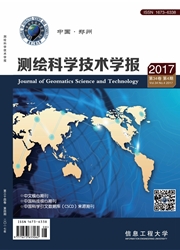

 中文摘要:
中文摘要:
为了探讨不同同化指标对顺序数据同化的影响,选择En KF,DEn KF,En SRF三种经典的顺序同化算法,结合Lorenz-1963模型进行敏感性实验分析,研究同化总时间、同化步长、集合成员数、方差膨胀因子、观测数目和局地化半径等指标对同化结果的影响。实验表明:同化总时间、同化步长、集合成员数、方差膨胀因子、观测数目和局地化半径对同化结果有直接的影响,基于En KF的改进算法在有限范围内是优于En KF的;当达到一定条件时,以上所有方法的同化结果趋于相同。研究结果对于实际应用中的最优顺序同化算法选择具有指导意义。
 英文摘要:
英文摘要:
In order to explore the influence of different assimilation indicators on the sequential data assimilation,in this paper, based on Lorenz-1963 model, we attempt to test the sensitivities of three typical assimilation methods, including En KF, DEn KF and En SRF. We have investigated the effects of different indicators on the data assimilation results. These indicators include the total assimilation time, the assimilation step, the ensemble number, the inflation factor, the observation number and the localization radius. The experimental results show that the total assimilation time, the assimilation step, the ensemble number, the inflation factor, the observation number and the localization radius directly affect the data assimilation result. The improved algorithm based on En KF is superior to the En KF under a given condition. When some preconditions are satisfied, the data assimilation results of all above methods tend to be the same. In practice, this work is of great significance in choosing the optimal sequential assimilation method.
 同期刊论文项目
同期刊论文项目
 同项目期刊论文
同项目期刊论文
 An Improved Coarse-grained Parallel Algorithm for Computational Acceleration of Ordinary Kriging Int
An Improved Coarse-grained Parallel Algorithm for Computational Acceleration of Ordinary Kriging Int 期刊信息
期刊信息
